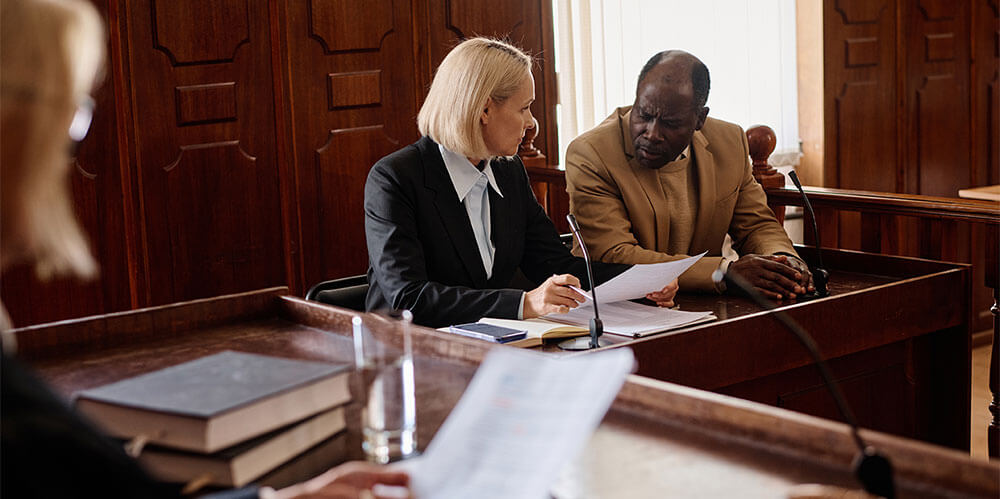What is Civil Litigation?
When individuals or entities find themselves embroiled in a legal dispute that does not involve criminal charges, the process that unfolds is known as civil litigation. This legal mechanism allows parties to seek justice for wrongs through the court system, and it encompasses a wide array of conflicts, from personal injury claims to contract disputes.
Understanding the intricacies of civil litigation in Louisiana is crucial for anyone involved in a legal dispute, as it can significantly impact the strategy and outcome of a case. As seasoned Louisiana civil litigation attorneys, the team at Dowden & Smith is here to fight for your rights. Contact us today and schedule a free consultation to discuss your case.
What is Civil Litigation?
Civil litigation is the legal process through which parties resolve non-criminal disputes in a court of law. Unlike criminal law, where the government prosecutes individuals for offenses against the state, civil litigation involves private parties—such as individuals, limited liability companies, corporations, and other entities—seeking to enforce or defend their legal rights.
The outcome of civil litigation typically involves monetary compensation or the enforcement of a right rather than criminal penalties such as imprisonment. It is a legal avenue for resolving disputes ranging from small claims to complex legal battles involving multiple parties and intricate laws.
The Civil Litigation Process

The civil litigation process is a structured series of steps that begins when a party files a complaint (or Petition, in Louisiana state court) and ends with a final judgment, and enforcement mechanisms. The stages of civil litigation include:
1. Pleadings: The initial phase of civil litigation involves the filing of a Petition by the plaintiff, which outlines the basis of the lawsuit, and a response by the defendant, which may include counterclaims (known as Reconventional Demands in Louisiana) or defenses. This phase sets the stage for the legal battle, as it lays out the claims and defenses that will be argued throughout the case.
2. Discovery: This phase allows both parties to gather evidence from each other through depositions, interrogatories (written questions), and requests for production of documents. Discovery ensures that both sides have access to the facts and evidence necessary to argue their case. It is a critical phase of civil litigation where legal strategies are often developed based on uncovered information.
3. Pretrial Motions: Parties may file motions to resolve or narrow the issues before trial, such as motions to dismiss or for summary judgment. These motions can significantly shape the course of the litigation, potentially even leading to a resolution without the need for a full trial.
4. Trial: If the case is not settled or dismissed, it proceeds to trial, where each side presents its evidence and arguments to a judge or jury. The trial is the culmination of the litigation process, where the parties’ legal and factual claims are finally adjudicated.
5. Judgment and Appeal: After the trial, the judge or jury renders a decision, which may be appealed to a higher court if one party believes there has been a legal error. The appeals process provides a mechanism for review of the trial court’s decision, ensuring that the legal principles and procedures have been properly applied.
An experienced civil litigation attorney, like those at Dowden & Smith, can guide you through the process and protect your rights. For honest, qualified legal representation, don’t hesitate to contact our team to schedule a free consultation.
[Related: Father’s Rights in Louisiana]
Louisiana Laws and Civil Litigation

Louisiana’s legal system is unique in the United States due to its roots in the French and Spanish civil law traditions, as opposed to the common law tradition found in the other 49 states. This distinction affects various aspects of civil litigation in Louisiana, including the terminology used and certain procedural rules.
For instance, Louisiana’s Code of Civil Procedure governs the process of civil litigation in the state, including provisions that may differ from those in other states. One notable example is using “articles” instead of “rules” to delineate procedures. Additionally, Louisiana law requires that all legal documents be filed in English, but if any party to a lawsuit does not speak English, the court must provide an interpreter. This reflects the state’s commitment to ensuring all parties have a fair opportunity to present their case, regardless of language barriers.
Another aspect of Louisiana law that impacts civil litigation is the state’s doctrine of comparative fault. In personal injury cases, for example, the court may apportion fault among the parties involved, which can affect the amount of damages awarded. This system allows for a more nuanced determination of liability and can lead to fairer outcomes for all parties involved.
[Related: Common Mistakes to Avoid When Starting Your Business]
Dowden & Smith: Experienced Civil Litigation Attorneys
When navigating the complexities of civil litigation in Louisiana, having knowledgeable and experienced legal representation is crucial. Dowden & Smith are civil litigation attorneys with a deep understanding of Louisiana’s legal system and a proven track record of representing clients effectively.
If you are seeking experienced representation that will fight for you in court, contact us today. Schedule a free consultation to discuss your case and hear your options.


